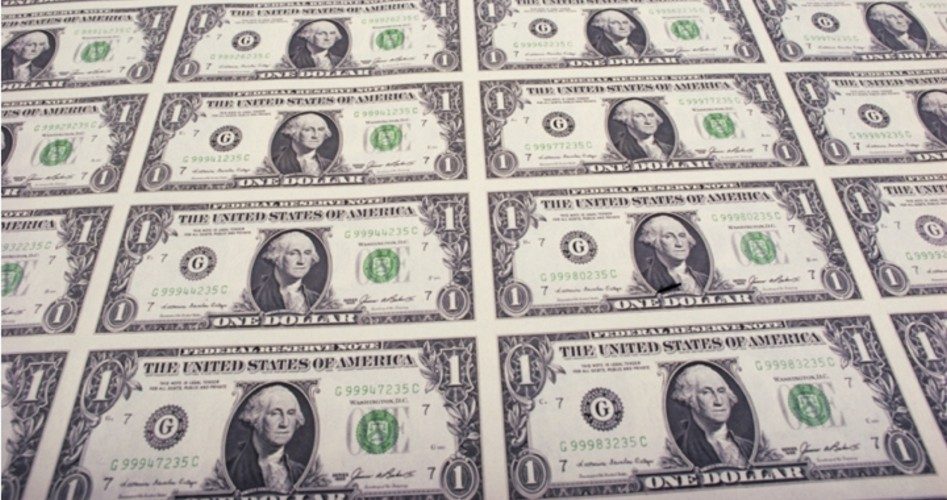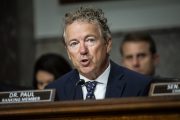
Following up on last year’s congressional efforts to audit the Federal Reserve, Republican Senator Rand Paul of Kentucky has re-introduced a bill that would subject the Federal Reserve to a full audit. A similar bill has been introduced in the House of Representatives by Republican Congressman Thomas Massie of Kentucky.
Reuters provides some background on controversy behind the audit: “The Fed is subject to various audits, including reviews by the Government Accountability Office (GAO). But since 1978, its monetary policy discussions have been legally exempt from a GAO audit. Some politicians say it is time to open up those deliberations to more public scrutiny.”
Sergio Gor, a spokesman for Senator Paul, said, “Transparency at the Federal Reserve remains a top priority for Senator Rand Paul.”
Critics of the Federal Reserve have long called for the entity to be more heavily scrutinized, while others have demanded that it be eliminated altogether.
The Federal Reserve was created in secrecy over 100 years ago. Despite its misleading name, it is an independent non-governmental organization consisting of a board of governors and 12 regional banks, and it serves as a lender to the country’s banking system. The alleged purpose of the entity is to fight inflation and promote economic growth, but critics have observed the group’s many failures in fulfilling those functions.
The 2008 financial collapse has given momentum to the movement to audit the Fed, with lawmakers now asking to look more closely at the decisions the Federal Reserve has made over the years.
Former congressman and presidential candidate Ron Paul, Rand’s father, was a leading advocate of auditing and ultimately ending the Federal Reserve. In 2011, he wrote a compelling piece for the Wall Street Journal wherein he placed the majority of the blame for the financial crisis, as well as the blame for past financial crises, squarely on the Federal Reserve:
The Federal Reserve has caused every single boom and bust that has occurred in this country since the bank’s creation in 1913. It pumps new money into the financial system to lower interest rates and spur the economy. Adding new money increases the supply of money, making the price of money over time — the interest rate — lower than the market would make it. These lower interest rates affect the allocation of resources, causing capital to be malinvested throughout the economy. So certain projects and ventures that appear profitable when funded at artificially low interest rates are not in fact the best use of those resources.
Eventually, the economic boom created by the Fed’s actions is found to be unsustainable, and the bust ensues as this malinvested capital manifests itself in a surplus of capital goods, inventory overhangs, etc. Until these misdirected resources are put to a more productive use — the uses the free market actually desires — the economy stagnates.
The Federal Reserve’s quantitative easing programs — money creation — have resulted in the addition of trillions of dollars to the national debt. These programs have served to devalue the dollar, eroding its purchasing power and increasing inflation.
Above all, Paul notes that the Federal Reserve is an unconstitutional establishment that has ultimately stripped Congress of powers that were assigned to it by the Constitution:
Abolishing the Federal Reserve will allow Congress to reassert its constitutional authority over monetary policy. The United States Constitution grants to Congress the authority to coin money and regulate the value of the currency. The Constitution does not give Congress the authority to delegate control over monetary policy to a central bank. Furthermore, the Constitution certainly does not empower the federal government to erode the American standard of living via an inflationary monetary policy.
In a statement released Monday, Rand Paul stated that the Fed works “under a cloak of secrecy,” and declared that an audit is the best way to ensure transparency. “[An] audit of the Fed will finally allow the American people to know exactly how their money is being spent by Washington,” Paul said.
Paul concluded that “the American people have a right to know what the Federal Reserve is doing with our nation’s money supply.”
Similarly, Norbert Michel, a research fellow in financial regulations at the Heritage Foundation, told the Daily Signal, “There is no justification for secrecy. They should have a full policy audit and the Federal Open Market Committee’s full transcript, not just the minutes, should be released.”
The Fed defends the secrecy of its open-market operations by claiming that the disclosure of any information could cause borrowers substantial competitive harm. Reuters writes, “Fed officials have said such exposure would complicate their public communications, hurt their credibility and stoke financial market volatility.”
Paul’s legislation would not simply institute a full audit of the Federal Reserve, but also would provide Congress oversight of Federal Reserve policies, including quantitative easing.
As long as Democrats maintained control of the Senate, legislation targeting the Federal Reserve has been unsuccessful, but with Republicans now in charge of both the House and the Senate, an audit-the-Fed bill certainly has a better chance.
Paul, believed to be a potential presidential contender for 2016, has found support for the bill amongst other possible Republican contenders, including Senators Ted Cruz of Texas and Marco Rubio of Florida. “The Fed has expanded its balance sheet fivefold, yet economic growth is still tepid, businesses are sitting on cash, and median income and household wealth are depressed,” Cruz noted in a statement.




